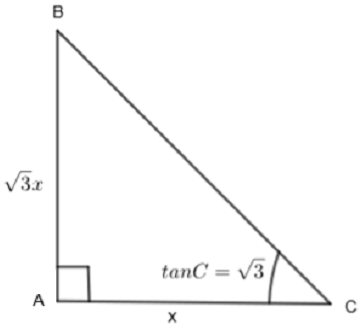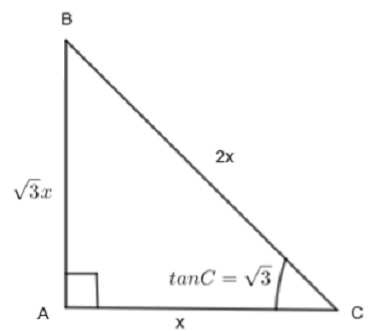Question
Question: In triangle ABC, right-angled at A, if \[\tan C=\sqrt{3}\], find the value of sin B cos C + cos B si...
In triangle ABC, right-angled at A, if tanC=3, find the value of sin B cos C + cos B sin C.
Solution
First of all, consider a triangle ABC and AB as 3x and AC as x. Now find BC by using Pythagoras theorem. Now, find sin B and sin C by using sinθ=HypotenusePerpendicular and find cos C by using cosθ=HypotenuseBase by substituting these values in the given expression to get the required answer.
Complete step-by-step answer:
Here, we are given a triangle ABC, right-angled at A. We are also given that tanC=3, we have to find the value of sin B cos C + cos B sin C. Let us consider a triangle ABC, right-angled at A.

Here, we are given that tanC=3. We know that,
tanθ=BasePerpendicular
We can see that, with respect to angle C,
Perpendicular = AB
Base = AC
We are given that
tanC=13=ACAB
So, let us consider AB as 3x and AC as x.
We know that Pythagoras theorem states that in a right-angled triangle, the square of the hypotenuse side is equal to the sum of the squares of the other two sides. So, in the above triangle ABC, by applying Pythagoras theorem, we get,
(AB)2+(AC)2=(BC)2
Now by substituting the value of AB = 3x and AC = x, we get,
(3x)2+(x)2=(BC)2
3x2+x2=BC2
BC2=4x2
BC=4x2
BC=2x

Now, with respect to angle C,
Perpendicular = AB = 3x
Base = AC = x
Hypotenuse = BC = 2x
We know that,
sinC=HypotenusePerpendicular=BCAB
So, we get,
sinC=2x3x=23....(i)
We also know that,
cosC=HypotenuseBase=BCAC
So, we get,
cosC=2xx=21....(ii)
Now, with respect to angle B,
Perpendicular = AC = x
Base = AB = 3x
Hypotenuse = BC = 2x
We know that,
sinB=HP=BCAC
So, we get,
sinB=2xx=21....(iii)
We also know that,
cosB=HypotenuseBase=BCAB
So, we get,
cosB=2x3x=23...(iv)
Now, let us consider the expression given in the question.
E = sin B cos C + cos B sin C
Now by substituting the values of sin B, sin C, cos B and cos C in the above expression, we get,
E=(21)(21)+(23)(23)
E=41+43
E=44=1
Here, we get the value of sin B cos C + cos B sin C as 1.
Note: Students can also do this question by considering the trigonometric table for general angles in the following way.
We know that,
tan60o=tanC=3
So, we get,
∠C=60o
We already know that,
∠A=90o
In a triangle,
∠A+∠B+∠C=180o
So, we get,
∠B=30o
We know that,
sinBcosC+cosBsinC=sin(B+C)=sin(30o+60o)=sin90o
We know that,
sin90o=1
So, we get, sin B cos C + cos B sin C = 1
